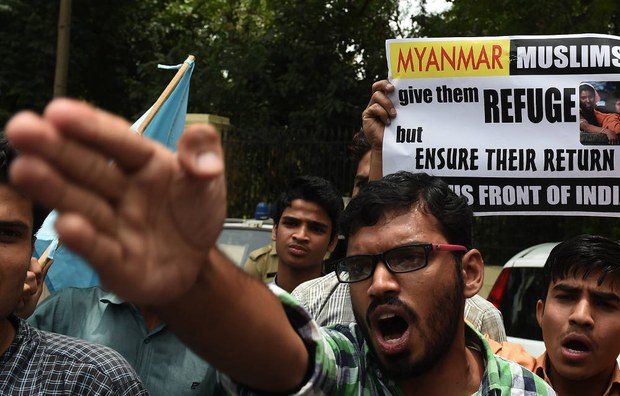Fearing Radicalization Attempt, India Ups Surveillance on Rohingya Refugees
2015.08.17
 Indian protesters shout slogans in support of Rohingya Muslims in Myanmar during a rally in New Delhi, June 1, 2015.
Indian protesters shout slogans in support of Rohingya Muslims in Myanmar during a rally in New Delhi, June 1, 2015.
A recent decision by Indian authorities to increase surveillance on Rohingya refugees over fears that outlawed outfits might attempt to radicalize them is a welcome move, analysts said, even as they doubted the possibility of the minority group’s involvement in terror activities.
“Vigilance is necessary,” Maj. Gen (retd) Asfir Karim, a security expert, told BenarNews. “But I doubt if Rohingyas, although … vulnerable to fundamentalist propaganda, can take part in terrorist activities in India, as they have no roots in the country.”
The decision to increase monitoring of movements of Rohingya refugees in India was taken by the Ministry of Home Affairs (MHA) following a late July meeting with the heads of 11 states where immigrants from the minority have settled.
The meeting was called in the wake of an intelligence report that suggested Rohingya refugees are “vulnerable to radicalization,” with banned terror outfits such as Lashkar-e-Taiba and Jamaat-ul-Mujaihideen trying to lure them into jihad.
“India has to ensure that Rohingyas are not subjected to ISI / Islamic propaganda or influence, acquire no arms or receive any training to mount terror attacks,” Karim, who has authored several books on military and strategic affairs, said in an email to BenarNews.
India has long accused Pakistan’s Inter-Services Intelligence (ISI) of involvement of terror activities in India, including in the disputed state of Jammu & Kashmir (J&K).
‘A close watch is necessary’
According to figures released by the Bureau of Immigration, some 10,565 Rohingyas have entered India since 2012, when Buddhist-majority Myanmar launched a wave of attacks on the population of nearly one million Rohingya Muslims living in western Rakhine state.
A large majority of Rohingya refugees live in the troubled state of Jammu & Kashmir (6684), followed by Andhra Pradesh (1755), Haryana (677), Delhi (760), West Bengal (309), Rajasthan (162), Uttar Pradesh (111), Punjab (50), Siliguri (42), Maharashtra (12) and Andaman & Nicobar Islands (3), figures from the bureau show.
Intelligence sources told BenarNews the number of Rohingya immigrants living illegally in India “may well be three times the figure suggested by the immigration bureau.”
“Recently, Delhi-based Rohingya youth have become proactive in placing the Rohingya issue on international forums and making contacts with the Saudi Arabia-based Gulf Rohingya Council. A close watch is necessary over the Rohingyas who are generally living in makeshift camps,” the MHA said in a communication sent to the 11 states, according to a report in The Economic Times.
As part of the added surveillance on the minority group, Rohingya refugees traveling domestically must inform the nearest police station of their itineraries, an MHA official told BenarNews, requesting anonymity.
They also have to register themselves with local police authorities, complete with details of their native village in Myanmar, family members, profession, income and source of income, the official added.
“It is learnt that Rohingyas are moving in and out of their settlements and traveling to J&K and other states. From now on, they will have to inform the local police station about their movement and also report to the police upon their return,” said a press release from Hyderabad police, in Andhra Pradesh state.
Legal recognition needed
The state capital’s police have also sought the help of the U.N. High Commissioner for Refugees (UNHCR) to keep a tab on Rohingyas living in the city.
“We appreciate the government’s right to know who’s living on their territory. Considering this, we have suggested to the government that the best way to monitor this is to register and give documentation to refugees,” UNHCR spokesperson Shuchita Mehta told BenarNews.
Despite hosting over 200,000 foreigners fleeing conflict-torn countries, India does not have a legal framework that recognizes or protects refugees.
Nawab Zafar Jung of the National Monitoring Committee for Minority Education agreed with Mehta, saying, even though vigilance on the vulnerable group is important, legal recognition is the need of the hour.
“These (Rohingya) are very poor and troubled people. If you give them a little bit of money, there is a good chance they’ll be ready to do anything. It’s important to keep a watch on them.
“But at the same time it’s important to give them legal refugee status so they can make a life for themselves here, so they can make an honest living,” Jung, who has long rallied for refugee status for the Rohingya minority in India, told BenarNews.
‘A small life’
Mohammed Farouq, a Rohingya refugee living in a makeshift camp in southeast Delhi since January 2013, said he had no problem with the Indian government’s decision to intensify surveillance on his group as long as his two children can hope for a future in the country.
“My wife and I fled Myanmar and came to India in hopes that our children may have a better future here,” said the 32-year-old, whose five-month-old son died after being bitten by a snake and receiving no medical attention, just months after arriving in the Indian capital.
“If they want to monitor our activities, they should, by all means. If we do anything wrong, arrest us. But please don’t let our innocent children die without giving them a fighting chance to live,” Farouq told BenarNews.
“People from the Rohingya community in India are not involved in any illegal activities,” Mansur Ahmed, president of the Burmese Refugees Relief and Rehabilitation Committee, told BenarNews on the phone from Hyderabad.
“They make very little money but they’re happy that they are at least alive. All they want is to live a small life that does not involve discrimination and persecution,” Ahmed said.







